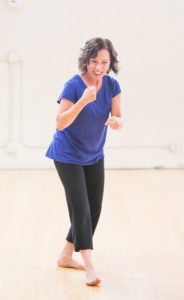Story #1 – Founder Story by Patricia Reedy

My journey as Luna’s founder has been long and winding; yet, certain themes, concepts, and values have endured. In the early days, volunteers including Jane and Richard Rosario, Amy Hutto, Tricia Freitas, Freesia Huth, and Lori Lara burned the midnight oil pulling out built-in benches, laying marley flooring, and installing safety devices. Twenty-five years later, our nine-person staff and numerous volunteers exert the same effort to pull together annual events such as 20 Points of View, CHOREOFUND, and Dance-a-rama. It takes a community to run Luna has been a constant. The CitiCentre dance teachers that found a new home at Luna, including Malonga Casquelourd, Roger Dillahunty, Leslie Carter, Danny Giray, and Hafeesah Dalji, have moved on; yet, they remain connected–last summer, Malonga’s daughter, Muisi-kongo, participated in our Summer Institute. The importance of relationships is another sustaining value.
When the African dance teachers relocated to the Alice Arts Center, now Malonga Casquelourd center, I had a chance to articulate a vision for Luna’s children’s program that emphasized nurturing the choreographer in every child. I saw this, at the time, from a feminist perspective. My own dance training was about trying to learn routines created by my teachers and perform them as perfectly as possible. I was a good follower and so did fairly well—but what about leadership? Typically, people became choreographers after they’d dutifully danced for others—what would happen if the choreography came first? What if every child learned to choreograph a dance like they learned to write an essay? Not everyone would be the next Alvin Ailey or Martha Graham, but not every child ends up the next Walt Whitman or Alice Walker either. So, I set out with these questions guiding Luna’s program design. Over the years, with a team of gifted, committed dance teachers (Laurie Foster, Erin Lally, Lori O. Lara, Bonner Odell, Freesia Paclebar-Huth, Alisa Rasera, Julie Regalado, Veleda Roehl, Chantal Sampogna, Sarah Sass, and many more) we crafted a pedagogy that keeps creativity front and center in our studio program, as well as in schools, community centers, residential treatment facilities, and Head Start centers.
Today, our team: Amelia Uzategui Bonilla, Cherie Hill, Deborah Karp, Nancy Ng, Jochelle Pereña, Carmen Roman, Heather Stockton, Nia Womack-Freeman, and myself are pooling our talents to take Luna into the next quarter century. What role can dance play to create positive change in the lives of children and those who care for them? How can we more boldly participate in conversations of race, equity, and justice in our roles as artists and educators? How can we wield the generosity of our board, our advisory council, and our funders to lead with integrity and develop Luna’s next generation of trailblazers?
